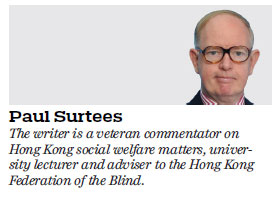Policy Address hits right notes on pressing social welfare issues
Updated: 2018-10-11 06:35
(HK Edition)
|
|||||||||
Chief Executive Carrie Lam Cheng Yuet-ngor's second annual Policy Address, delivered to the Legislative Council on Wednesday, provides an opportunity for the SAR government to set out its top priorities for the year ahead. Lam has fairly pointed out that "there is no perfect solution in this world." Realistically, any such address is unlikely to be able to please everyone, because there are so many vested interests, all with very differing and very pressing needs, spread across the wide range of Hong Kong governmental responsibilities. However, this latest effort manages to strike many of the right notes, and the very broad scope of concrete improvements envisaged on social issues will surely go a long way to support and satisfy many.
It is good to note that our community's disabled citizens are going to be better supported. Strengthened family home support services will be made available to families looking after disabled members. Rehabilitation and other additional services are to be provided through five new district support service centers. More new resources will be laid on in the field of home-based care services, including speech therapy and better transport support.
Another approach that has long been suggested (but not yet taken up) would be to oblige our big employers to accept a set quota of disabled citizens to their workforce, thereby achieving financial and emotional self-reliance for our disabled.

To encourage more of our youngsters to raise a family, and thereby limit the growth of an ageing population, measures will be introduced to offer more (extended from three to five) days of paternity leave, and more (from 10 to 14) weeks of maternity leave. Both steps are welcome.
With our rapidly ageing population, the time has come to provide greater support to our elderly citizens and to their carers, and this Policy Address rightly offers a lot here. The coming expected shortage of trained personnel can be partly alleviated by importing them, which our government is now considering. In parallel with that, many more healthcare professionals will be trained in Hong Kong, an approach that is well-considered.
The promised HK$300 billion allocated to healthcare infrastructure improvements will be money well spent. For example, some 9,000 additional hospital beds will be provided, alongside increased hospital facilities.
The planned provision of more daycare units set up in residential care homes for the elderly is another welcome measure. An enhanced bought place scheme to provide respite for family carers of the elderly is another useful improvement. Providing several more support centers for those with autism is another good move; as is also the project to fund community network buildings to be located in public rental housing estates. The HK$100 million annual support allocated to enhancing district-based primary healthcare services represents another welcome step, which will benefit many.
Traditional Chinese medicine will be subsidized more, to bring it into the mainstream of our healthcare system; and HK$500 million will go to fund developments in this area. With the government setting a good example of a generous employer, such TCM provisions will be added to the medical benefits of all our civil servants.
The plan to totally ban e-cigarettes and other "new" tobacco-like products, such as herbal cigarettes, is a brave move, since the jury is still out on the precise health dangers from consuming such products. Some cigarette smokers have managed to quit by changing to smoking e-cigarettes. The latter are thought to be less injurious to health than traditional tobacco cigarettes, though their long-term health effects remain unknown. On the negative side, some youngsters have struck up a habit of smoking by starting with e-cigarettes, leading later to smoking real cigarettes. Therefore this is a welcome ban, to be on the safe side.
It is already common knowledge that almost all the foreign domestic helpers working here have been ripped off by their overseas recruitment agencies, so the plan to step up actions against those unscrupulous agencies is needed, and well overdue. A further step toward fairer treatment of them would be to grant them permanent residency after toiling for seven years here - the same as for all other foreigners working in Hong Kong.
Although the offsetting mechanism of the MPF will be gradually phased out, the MPF system as it stands (offering only a lump sum on retirement, with no pension) remains inadequate to support our retirees. The oft-wished-for provision of a universal pension remains, unfortunately, a pipe dream.
In her debutante Policy Address last year, Lam expressed her vision for a Hong Kong of hope and happiness, and ends this year's address with the desire to strive to rekindle hope for Hong Kong. Such welcome ideals may not be so very easy to achieve, but it is laudable to hold on to that vision. So, even though this latest Policy Address cannot be expected to be received with the greatest delight in all quarters, as far as it went it did present a considerable range of very-welcome improvements, and our chief executive and her administration can be thanked for them.
(HK Edition 10/11/2018 page10)